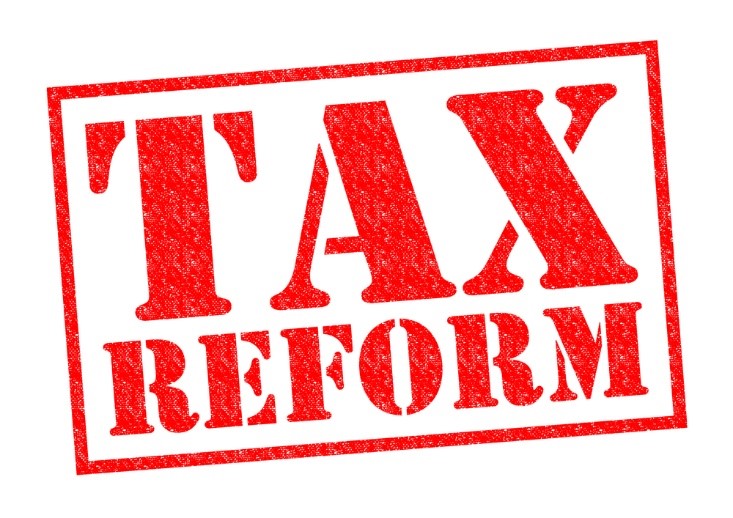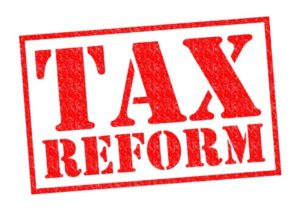
How Tax Reform May Impact Near-Retirees And Retirees
 The Tax Cut and Jobs Act of 2017 lowers income-tax rates for all tax brackets, especially for high earners, and raises the estate-tax exemption—both of these changes benefit the wealthiest Americans. While the wealthy are clear winners, the vast majority of Americans will pay the same or less in taxes for more than one reason. First, there is the drop in tax rates across all income levels. Second, due to low income levels, almost half of Americans paid almost no federal income tax under the old tax structure; that statistic should remain stable or slightly increase under the new Tax Act. Note: this group includes a majority of our senior citizens, many of whom aren’t required to file a tax return due to low income levels (according to Bankrate, the median household income for Americans over age 65 is under $40,000).
The Tax Cut and Jobs Act of 2017 lowers income-tax rates for all tax brackets, especially for high earners, and raises the estate-tax exemption—both of these changes benefit the wealthiest Americans. While the wealthy are clear winners, the vast majority of Americans will pay the same or less in taxes for more than one reason. First, there is the drop in tax rates across all income levels. Second, due to low income levels, almost half of Americans paid almost no federal income tax under the old tax structure; that statistic should remain stable or slightly increase under the new Tax Act. Note: this group includes a majority of our senior citizens, many of whom aren’t required to file a tax return due to low income levels (according to Bankrate, the median household income for Americans over age 65 is under $40,000).
Most senior citizens at higher income levels (middle class and higher) should benefit from lower federal income-tax rates and receive a net tax savings. But some will also feel the pinch from reduced tax deductions for property, state, and local income taxes—which may slightly offset the full amount of their anticipated tax savings. According to Thomas Proffitt, a CPA in Urbana, MD, “Those benefitting the least from the Tax Act are middle to high-income earners in high-tax states with no children”—and this includes empty-nesters with the flexibility to relocate to a low-tax state. Of course relocating is a complex decision, but Americans are becoming more mobile, and many middle-class and wealthy retirees have already left high-tax states for tax-friendly confines such as Texas, Nevada, and Florida. Florida, for example, has the highest percentage of seniors of any state in the country.
One of my favorite stories is the pair of retired teachers from New Jersey earning over $150,000 in state pensions who moved to Florida to avoid the Garden State’s onerous property and income taxes. Now, with the Tax Act’s reduced tax deductions, more residents with similarly high incomes will conduct their own “cost-benefit” analysis of relocating. This is why legislators from high-tax states are threatening lawsuits against the Federal Government over passage of this Tax Act. Whether you like it or not—and that may depend on which state you live in—the Act was clearly designed to reduce federal “subsidies” to the higher earners of higher-tax states.
Relocating to a lower-cost area in a lower-tax state (or even making the lifestyle choice of renting) can yield sizable savings. Retirees, who often have the flexibility to be more geographically mobile, can benefit from a possible combination of strategies:
- Lowering (or eliminating) property taxes (e.g., downsizing or renting)
- Lowering (or eliminating) state and local income taxes (e.g., moving to a low-tax state)
- Utilizing the Tax Act’s increase in the standard deduction* (especially if you were not itemizing previously)
- Benefiting from the new lower federal income-tax rates
- Lowering overall home ownership costs (e.g., downsizing or renting)
*In the Tax Cut and Jobs Act of 2017, there is a significant increase in the standard deduction (the dollar amount that non-itemizers may subtract from their income before income tax is assessed): $12,000 for singles, $18,000 for heads of household, and $24,000 for married couples. This may offset the elimination of the personal exemption as well as the loss of any deductions.
What kind of tax savings might an upper-middle-class retiree receive from the Tax Act? Consider a single person with annual taxable income of $75,000. With an estimated percentage tax savings (assuming a standard deduction) of 3.2%, their annual tax savings is $2,400.
| Filing Status | Standard Deduction | Number of Children | Range of Earnings | Estimated Percentage Change in 2018 Tax |
| Single | Yes | 0 | $40,000 to $70,000 | -2.7%
|
| Single | Yes | 0 | $75,000 to $125,000 | -3.2 |
Source: CNN
The estimated savings will vary for each person and generally will remain in these ranges until 2025, unless Congress acts to extend.
Looking at this same single filer and assuming they live in New Jersey, their state income tax will be $2,653. This disappears if they move to Florida (a state with no state income tax). Add this to their drop in federal taxes under the new Tax Act, and this person may have a total tax savings of over $5,000 per year!
Of course there is a lot to consider before deciding to move, but expect to see more people getting serious about relocating as they look closely at the all-in costs of staying in their high-tax state. Collectively, large numbers of citizens moving to low-tax states may lead to significant societal shifts, the true costs of which are unknown. But on an individual level, the lower tax rates in the Tax Act might present an opportunity to improve your financial life during your golden years—whether you relocate or not.



Engage us on Facebook
Follow us on Twitter
Tweets by @mymcmedia